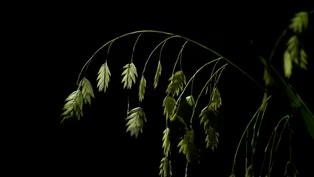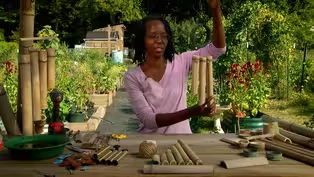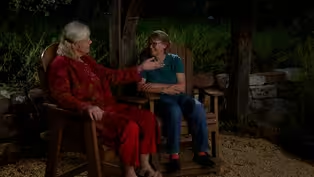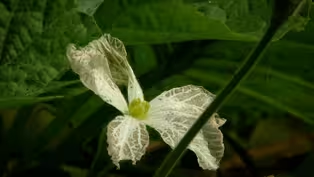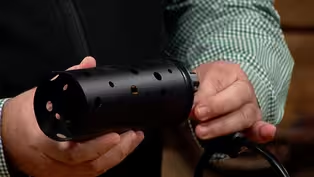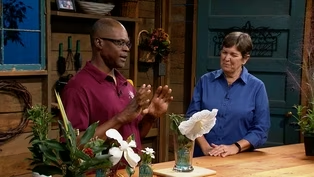Virginia Home Grown
Light Pollution and Plants
Clip: Season 25 Episode 7 | 8m 8sVideo has Closed Captions
Learn why a day and night cycle is just as important to plants as it is to us
Peggy Singlemann visits astronomer Kelsey Johnson at UVA’s Morven Sustainability Lab to learn how light pollution impacts plants and wildlife. Featured on VHG episode 2507, September 2025.
Problems playing video? | Closed Captioning Feedback
Problems playing video? | Closed Captioning Feedback
Virginia Home Grown is a local public television program presented by VPM
Virginia Home Grown
Light Pollution and Plants
Clip: Season 25 Episode 7 | 8m 8sVideo has Closed Captions
Peggy Singlemann visits astronomer Kelsey Johnson at UVA’s Morven Sustainability Lab to learn how light pollution impacts plants and wildlife. Featured on VHG episode 2507, September 2025.
Problems playing video? | Closed Captioning Feedback
How to Watch Virginia Home Grown
Virginia Home Grown is available to stream on pbs.org and the free PBS App, available on iPhone, Apple TV, Android TV, Android smartphones, Amazon Fire TV, Amazon Fire Tablet, Roku, Samsung Smart TV, and Vizio.
Providing Support for PBS.org
Learn Moreabout PBS online sponsorship>>Kelsey, I have to admit, I have never given a garden interview in the dark.
So this is a first for me.
(chuckles) >>Well, as an astronomer, I have never been on a garden show, so this is also a first for me.
>>Well, this is exciting.
'cause here we are at UVA's Morven Sustainability Lab and it's getting darker by the minute, but that's what we're here to talk about.
>>In the world today, 80% roughly of the global population lives under severely light polluted skies.
As an astronomer, this is a problem, but it turns out it's also a really big problem for everything else that lives on the surface of the planet.
>>Our circadian rhythm is really connected to that dark sky, that rhythm of our living and even our processes, you know, our plant processes and stuff.
So what have you discovered as you've brought the darkness down to the earth, you all call it?
(both chuckling) >>Well, yes.
We have to bring things down to earth.
Well I think, you know, one thing that I think is glaringly obvious if you think about it, is that everything that lives on the surface of the earth has evolved actually over millions of years, a very finely honed biological system that depends on the day, night cycle.
In modern life, when we have artificial light at night, we're actually messing up something that things have evolved to have over millions of years.
And it causes a lot of stress.
>>It does.
People just don't understand that plants have processes during the day, photosynthesis, but they also have them at night.
>>That's right.
>>You know, and if you don't have that darkness, the plant can't shift over to do its nighttime respiration.
But there's other processes dealing with plants that are affected by the lack of a dark sky as well.
>>So many, I mean, almost everything you can think of with plants is affected by their sensitivity to daylight.
So we could think about, for example, blooming out in the spring, right?
If plants start getting or perceiving that they're getting more daylight, they might think, oh, it's spring, it's time to bloom.
And we might think, oh, they're blooming.
They're so pretty.
But here's the thing, right?
If they bloom too early, what happens?
>>Well, you don't have the insects coming out to match the plants.
>>That's right.
>>You don't have the pollination.
>>That's right, they've shown up early to the party, no one's there.
>>Exactly.
>>Well, and the other thing that can happen is frost, right?
If it's still early in the season, and we're not outta danger of a hard frost yet, you know, if plants bloom to early, they're in danger of actually losing that entire reproductive cycle, which is a lot of energy for a plant.
>>You know, we think about the pathetic tomato on the sad plant, but that plant's putting everything it can, into making into seed.
Yes.
>>Into reproducing itself.
>>Yeah.
And it will lose that if it happens too early.
>>Exactly.
And exactly.
And the same with leaf color change.
You know what triggers leaf color change, a myriad but day length is one of them.
>>Exactly, and so when they get their cues wrong, because they're around artificial light at night, they might leaf out too early in the spring or in the fall.
Likewise, they don't get the cue that, oh, it's time to go into hibernation and let those leaves go.
And they waste a lot of energy holding onto those leaves that they need to be putting into themselves and into their systems.
>>And you know, we don't think this affects us, but it does be.
Think about your fruit tree growers.
>>Yeah.
>>Think about your farmers.
Think about the importance of the health of those plants and the timing of the bloom to meet the insects so that those fruit tree flowers can be pollinated.
So we can have our fruit and think about the bread baskets to feed everybody here on earth.
So I mean, it draws a direct line from dark sky to the plant to us.
>>It does.
When many people take a step back and think about greenhouses and how do we get tomatoes in the winter, people understand the importance of light signals to get things to bloom or to fruit at particular times of year.
>>Right.
>>But, when we do it in that controlled way, we're doing it on purpose and with a goal, what's happening with light pollution is we're doing some of that light engineering by accident and not in a productive way.
>>Right, animals too, with their processes and disrupting some of our wildlife, particularly our insects.
>>Yeah.
I think a lot about pollinators and I know many people are thinking about pollinators in the world right now.
And often when we think about pollinators, I think bees get all be attention and they should.
I love bees.
I'm like, I'm a fan of bees with everyone else.
But I think what people often don't realize is that when it's dark at night, a whole night shift of pollinators come out and moths.
Anyone that has been outside at night with a light understands what moths do with light.
So I think it's pretty intuitive to understand when moths are around light pollution, they're gonna get distracted.
They're gonna go into like doom scrolling with the light, and they're gonna fly around and they're not gonna go do the important work of pollinating.
>>And I know too, bird migration.
>>Yeah.
>>Because, birds are running into buildings trying to survive and live in this brighter environment when they're used to navigating really by the stars.
>>That's right, many birds use light cues to navigate at night.
In North America, it's roughly 50% of the bird species are in decline.
So this is a real growing crisis.
And estimates are, and this number I think is astounding.
Roughly a billion birds in the US die a year from collisions with buildings.
>>Wow.
>>And so, turning our lights off and being aware of the illumination we have in the corridors that birds use to migrate, it's really important.
>>That is extremely important.
So now that we've kind of defined the problem, I know that we have a dark sky movement that's slowly gaining momentum.
You know, what are the steps that homeowners could take to sort of improve their situation?
>>Light pollution is actually one of these problems that is in principle, super easy to fix.
Like we could almost literally fix it overnight, if we had the mindset and the will to do it.
Don't use lights when you don't need them.
Don't use lights brighter than you need them.
When you do need lights, make sure they're pointed down.
If I can make one plea to your viewers, (both laughing) one simple thing is just please don't uplight your trees.
But then, you know, there are other things too that may seem less intuitive.
One really important thing about outdoor lighting at night, if you get a light bulb that says daylight on it, it's mimicking daylight.
We wanna avoid those at night.
So for nighttime, you really wanna use warmer color temperatures.
So redder lights, it's not that there aren't still impacts on the flora and the fauna, but they're not as bad as when we're using the daylight.
>>Well, I have one more question for you, and this is for the astronomer.
>>Okay.
>>I have been seeking a dark sky to go to experience that.
So where would you recommend I go?
>>Oh goodness.
East of the Mississippi, there are really only two spots left.
>>Oh, wow.
>>And, those are in extreme, Northern Minnesota.
>>Okay.
>>And extreme Northern Maine.
Those are your options.
>>Two of my favorite places.
>>I mean, I'll go to Maine with you.
That'll be fun.
>>It's a deal.
Let's go.
>>And we can look at gardens and stars.
>>Okay.
>>But locally, you know, we really, within Virginia, we don't have access to any pristine dark skies.
But just over the border in West Virginia, there is a pocket of darkness that it's not pristine, but it's darker than anywhere else on the East Coast.
So we do have something drivable from here.
>>Okay, but we do have capabilities to make choices that are more positive to helping to mitigate this problem.
And I think we all need to just learn more so that we can consider those choices as we move forward.
>>Such simple choices.
Right.
It doesn't take a lot to make a really big difference.
Even just in your backyard, you can change the ecosystem and make it healthier, just by reducing the illumination at night.
>>Collectively.
We make a huge difference.
>>We do.
We do.
>>So, thank you, Kelsey, thank you so much for coming on, being an astronomer on the gardening show.
(chuckles) >>My pleasure.
>>Yes.
(crickets chirping)
Clippings: The Nighttime Garden
Video has Closed Captions
Clip: S25 Ep7 | 26m 46s | Explore the garden after dark! (26m 46s)
Video has Closed Captions
Clip: S25 Ep7 | 3m 35s | Calming sounds benefit your garden day or night (3m 35s)
Video has Closed Captions
Clip: S25 Ep7 | 7m 36s | Visit a garden full of native plants designed to be enjoyed at night (7m 36s)
Night Pollination in the Vegetable Garden
Video has Closed Captions
Clip: S25 Ep7 | 2m 43s | Pollination occurs around the clock in our gardens (2m 43s)
Responsible Landscape Lighting
Video has Closed Captions
Clip: S25 Ep7 | 6m 18s | Learn how to reduce glare and enhance your garden lighting design (6m 18s)
Traditional Moon Garden Plants
Video has Closed Captions
Clip: S25 Ep7 | 6m 23s | Discover the characteristics of plants for night time gardens (6m 23s)
Providing Support for PBS.org
Learn Moreabout PBS online sponsorship

- Home and How To

Hit the road in a classic car for a tour through Great Britain with two antiques experts.












Support for PBS provided by:
Virginia Home Grown is a local public television program presented by VPM
